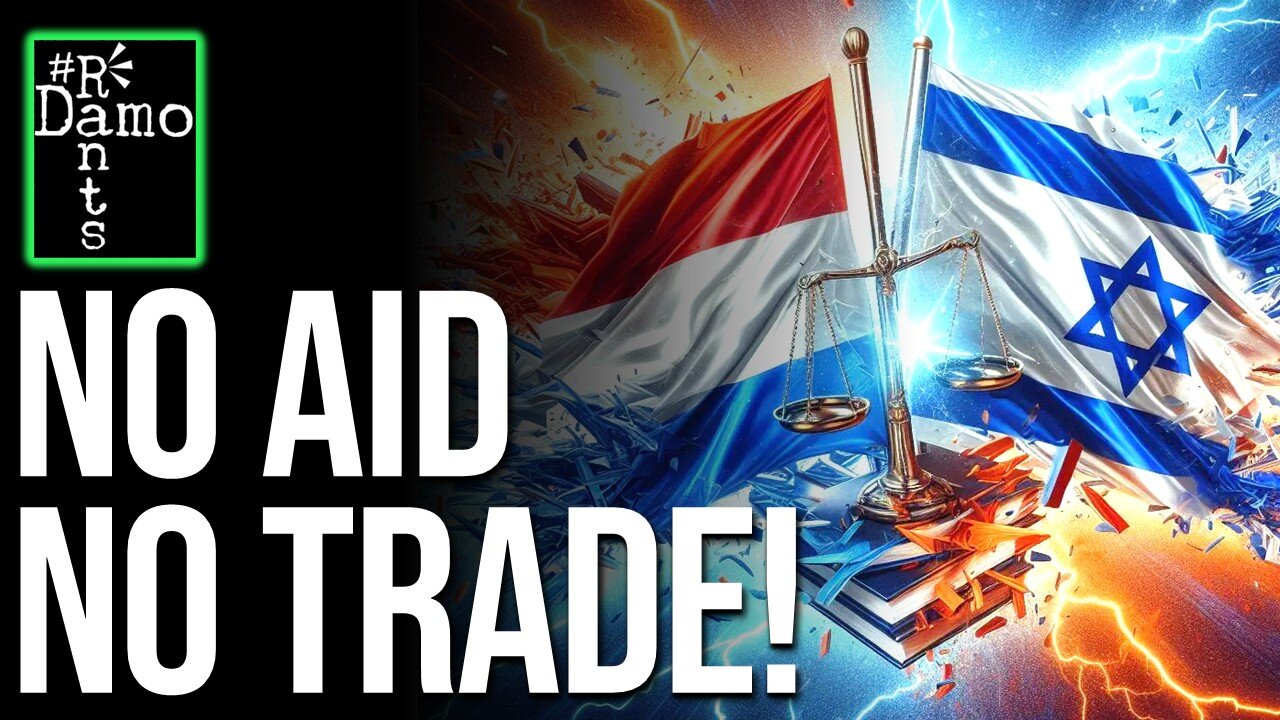Premium Only Content

Netherlands & Sweden Just Called Israel’s Bluff – And It’s Working
Right, so the European Union has now found itself confronting a challenge it has for too long been evading. The Netherlands, off the back of formally declaring the state of Israel to be a national security threat, has now formally informed Israel’s ambassador in Amsterdam that it will now push for the suspension of the trade-related section of the EU–Israel Association Agreement. Adding further weight to this declaration, Sweden has now declared publicly that it would join the Dutch in this call.
This joint move marks a massive escalation in the EU’s internal debate about how to respond to Israel’s ongoing war in Gaza and the conditions imposed upon its population. For decades, the EU had signed agreements with Israel, coupled them with human rights language, and yet shied away from using that language as a legal basis for enforcement. The Netherlands and Sweden’s intervention is now challenging that long-standing pattern of rhetorical concern that never gets backed up with any concrete action.
The facts remain that Gaza’s civilian population had faces catastrophic conditions. Reports from the World Food Programme, UNRWA, Médecins Sans Frontières, and other independent observers indicated acute malnutrition, widespread food insecurity, and blockades that choked the flow of life-saving supplies. So against this backdrop, the decision by two EU member states to seek suspension of trade preferences is not a gesture of political protest, its demanding something that should have been done already finally be enacted.
Right, so the EU–Israel Association Agreement, which entered into force in June 2000, is a cornerstone of the bilateral relationship between the EU and Israel. It is one of the most comprehensive association agreements the EU maintains with any non-member country, encompassing not only trade but also political dialogue, economic cooperation, and cultural exchange.
At its core is Article 2, the so-called “human rights clause,” which states that relations between the parties shall be based on respect for human rights and democratic principles, and that these principles constitute an essential element of the agreement. Article 79 provides the enforcement mechanism, allowing either party, in the event of a serious breach, to take “appropriate measures,” which may include suspension of certain provisions. In legal terms, this clause is not a symbolic preamble but a condition that underpins the entire agreement. Without adherence to it, the preferential arrangements that follow are not justified.
Yet in the twenty-five years since the agreement’s signature, the EU has never suspended the trade chapter under Article 2, despite repeated instances in which Israel’s conduct in the occupied Palestinian territories has been condemned by international bodies as violations of international law. Instead, the EU has pursued more limited measures, such as its 2015 guidelines requiring the labelling of products originating from Israeli settlements in the West Bank. That step, while significant in signalling non-recognition of settlement legality, left the underlying trade preferences intact. This history has fuelled accusations from civil society and from governments in the Global South that the EU’s human rights clauses are applied selectively, depending on the political sensitivities involved.
The Netherlands and Sweden’s decision to move from rhetoric to enforcement was shaped by a convergence of humanitarian, legal, and political pressures. In the Dutch case, Foreign Minister Caspar Veldkamp told the national parliament that Israel was “not fulfilling its most basic obligations” under both international law and the association agreement itself. He emphasised that the humanitarian situation in Gaza was “terrible” and that the Israeli blockade was fundamentally incompatible with the essential elements clause. For Sweden, Prime Minister Ulf Kristersson and Foreign Minister Maria Malmer Stenergard delivered unusually forthright public statements, describing civilian starvation as a war crime and urging the EU to act quickly to freeze the economic preferences in order to pressure Israel to allow unhindered humanitarian access.
Both governments were responding not only to the facts on the ground but also to domestic political currents. In the Netherlands, sustained public protest, cross-party concern over the legality of Israel’s actions, and a political culture that treats treaty compliance as a matter of national identity all pushed the government toward a harder line. In Sweden, the Gaza crisis fractured the usual cross-party restraint on Middle East policy, with humanitarian imperatives cutting across traditional ideological divides.
The immediate procedural context for this push is the EU’s ongoing review of Israel’s compliance with Article 2 of the Association Agreement. That review, initiated back in June, after pressure from the Netherlands again and sixteen other member states, is tasked with determining whether Israel’s actions in Gaza amount to a serious breach of the human rights clause. If it concludes that they do, the European Commission has the authority to recommend “appropriate measures” to the Council of the EU.
The nature of those measures, and the legal basis chosen, matter greatly for how the decision can be taken. If the measure is framed as a suspension of the trade chapter — the tariff preferences granted to Israeli goods — it falls under the EU’s Common Commercial Policy. Decisions in that area are taken by qualified majority vote, meaning that 55 per cent of member states, representing at least 65 per cent of the EU’s population, must agree. This is a markedly different threshold from that required for foreign policy sanctions under the Common Foreign and Security Policy, which require unanimity. The trade route thus allows a determined coalition to act even if a handful of powerful states object.
This legal pathway is part of why the Netherlands and Sweden’s move is so significant. It signals that they are aiming for a decision that can, in theory, bypass the unanimity vetoes that have long shielded Israel from EU-level sanctions.
For the suspension to pass under qualified majority rules, the Netherlands and Sweden would need to build a coalition that goes beyond the usual group of human-rights advocates in EU trade policy. Certain allies are likely. Ireland, Spain, Belgium, Luxembourg, Finland, Slovenia, and Portugal all have records of supporting stronger human-rights enforcement and have in recent months criticised Israel’s conduct in Gaza. Several of these states were part of the nine-member group that in June called for talks on ending trade with Israeli settlements.
The key swing states are France, Poland, and Denmark. France, as one of the EU’s largest economies and most influential foreign policy actors, carries substantial weight. If Paris aligns with the pro-suspension bloc, it significantly boosts the population share toward the 65 per cent threshold. Poland and Denmark, while less influential individually, could be decisive in reaching the required state count.
Opposition is expected from Germany, which remains committed to strong bilateral ties with Israel, and from Hungary, Austria, and the Czech Republic, which have often acted as Israel’s defenders within EU decision-making. Italy’s position is uncertain; while not always aligned with Israel, the Meloni government is generally sceptical of trade-based sanctions.
Should the Council agree to suspend the trade chapter, the immediate economic effect would be to remove the preferential tariff rates that Israeli goods currently enjoy in the EU market. In 2024, EU imports from Israel totalled €15.9 billion, making the EU Israel’s largest trading partner. These imports consist mainly of industrial products such as machinery, transport equipment, chemicals, and pharmaceuticals, along with a substantial volume of agricultural goods.
Under the association agreement, most of these products enter the EU either duty-free or at reduced tariffs. Without those preferences, they would revert to the EU’s Most Favoured Nation tariff schedule. The EU’s average MFN tariff is approximately 5.1 per cent on a simple average basis and about 3.0 per cent on a trade-weighted basis. For Israel’s current export profile, the effective tariff increase would likely fall between 2 and 4 per cent, with agricultural products facing higher rates.
In monetary terms, this translates into direct additional tariff costs of roughly €320 to €640 million annually, potentially rising to €800 to €900 million if all high-tariff agricultural products are included. The distribution of this cost between Israeli exporters and EU importers would depend on market conditions and contractual arrangements. Beyond these direct costs, Israeli producers could face reduced market share as EU buyers shift to suppliers with preferential access, compressed profit margins as exporters absorb some tariff costs, and heightened compliance and reputational risks that might lead multinational companies to reassess supply chains involving Israel at all.
The political and reputational implications for Israel of even the current stage — two EU governments openly calling for suspension — are substantial. For years, Israel has countered calls for economic pressure by portraying them as the work of fringe activists or ideologically driven NGOs. When the advocates are instead established EU member states, citing binding treaty obligations, that portrayal loses all plausibility.
The invocation of Article 2 as a legal basis carries its own weight. It is not simply an expression of moral outrage but a formal assertion that Israel is in breach of a foundational element of its agreement with the EU. This places Israel in the same category, procedurally, as states the EU has penalised for human rights abuses, such as Belarus or Myanmar. The stigma attached to that classification can be leveraged by other states and international organisations to justify their own restrictive measures.
By framing the Gaza blockade as incompatible with the norms of civilised trade, the Netherlands and Sweden are also helping to shift the narrative away from the idea that such matters are purely political disputes. Once established in EU discourse, this framing can influence debates in multilateral bodies and in other bilateral trade relationships.
For the European Union, the stakes go beyond the bilateral relationship with Israel. The credibility of the EU’s human rights clauses, embedded in all its association and trade agreements, is directly at issue. For decades, Brussels has presented itself as a “values-based” trading power, insisting that access to its market comes with obligations to uphold fundamental rights. If, faced with extensive documentation of humanitarian catastrophe and treaty breach, the EU fails to act, it sends a message that these clauses are ornamental, to be ignored when politically inconvenient, disastrous reputationally for the bloc.
Conversely, enforcing the clause would strengthen the EU’s claim to be a rule-bound actor, willing to apply its standards even to politically sensitive partners. It would also set a precedent that could be invoked in other contexts, bolstering the cause of those who argue for linking trade preferences to human-rights performance in a meaningful way.
If the pro-suspension coalition achieves a qualified majority and the Council votes to suspend the trade chapter, it will mark the first time the EU has applied such a measure to Israel. The economic consequences for Israel, while not catastrophic at a functional level, will still be felt sharply in specific sectors, particularly agriculture and certain manufacturing niches. Politically, Israel will almost certainly respond with strong condemnation like they always do, accusations of bad faith, possible reductions in cooperation in areas like research and security, I wouldn’t bet money against them saying the EU are antisemitic as well. Yet the precedent will have been set: the EU’s human-rights clause is enforceable.
If, on the other hand, the push stalls — whether because the Commission delivers an equivocal review or because the Council cannot assemble the necessary votes — the consequences for the EU’s credibility will be severe. After months of process and mounting evidence, inaction will be read as abdication. It will confirm the suspicion that the EU is willing to enforce its values only against partners with little political clout. Civil society within Europe, along with sympathetic national governments, may respond by taking their own measures and certainly we’ve seen some of that already, such as Slovenia with its full arms embargo of Israel, but more widely we could see banning of settlement products – something Slovenia has also now announced for itself - restricting procurement from Israeli firms, or advancing recognition of Palestinian statehood.
Whatever the immediate outcome, the intervention by the Netherlands and Sweden has already shifted the EU’s internal discourse. By grounding their calls in the legal framework of the association agreement, they have demonstrated that enforcement is not merely theoretical. This could embolden other member states to use similar arguments in different contexts, from North Africa to the Western Balkans.
For Israel, the episode underscores that its once-secure position within Europe is no longer guaranteed. Even if suspension is avoided this time, the fact that it was seriously contemplated at the Council level signals a new phase in the relationship, one in which legal obligations and human-rights performance are more likely to be linked to market access.
The decision by the Netherlands and Sweden to call for suspension of Israel’s trade preferences over the Gaza crisis represents a turning point for the European Union’s values-based trade policy. It poses a direct challenge to the EU’s self-image and to its willingness to enforce the obligations it has embedded in its agreements. Acting would demonstrate that the EU is prepared to uphold its standards even when it is politically difficult. Failing to act would confirm that economic and strategic considerations override human-rights commitments.
In either case, the reputational damage to Israel has already been done therefore and would be all the more so, if mainstream media outlets were reporting on this, so do support your favourite independent outlets if you can, to get the news you need to know. Two credible European governments have declared, in legal terms, that Israel’s actions in Gaza violate the foundational terms of its relationship with the EU. That declaration should resonate far beyond the confines of Brussels diplomacy, influencing perceptions in markets, in international forums, and in public opinion across Europe and beyond, but only if people actually get told about it.
For more on the Netherlands having declared itself that Israel is now a national security threat, do check out this video recommendation here as your suggested next watch.
Please do also hit like, share and subscribe if you haven’t done so already so as to ensure you don’t miss out on all new daily content as well as spreading the word and helping to support the channel at the same time which is very much appreciated, holding power to account for ordinary working class people and I will hopefully catch you on the next vid. Cheers folks.
-
 LIVE
LIVE
The Quartering
41 minutes agoMotive In Church Attack Revealed, Dangerous Walmart Food Kills, Eric Adams Out & More
19,918 watching -
 LIVE
LIVE
Right Side Broadcasting Network
5 hours agoLIVE: President Trump Participates in a Press Conference With Prime Minister Netanyahu - 9/29/25
6,312 watching -
 LIVE
LIVE
Dr Disrespect
3 hours ago🔴LIVE - DR DISRESPECT - BABY STEPS - TO THE TIPPITY TOP
1,680 watching -
 1:25:35
1:25:35
Russell Brand
2 hours agoMichigan Church Shooting Sparks Trump Warning Of ‘TARGETED ATTACK On Christians’ - SF641
131K37 -
 1:59:24
1:59:24
The Charlie Kirk Show
2 hours agoRemembering Charlie's Martyrdom and Continuing His Revival | Driscoll, McPherson | 9.29.2025
153K38 -
 LIVE
LIVE
Sean Unpaved
2 hours agoEuropeans Too Good, Lamar's Limp-Off, & the MLB's Playoff Party: Weekend Sports Review
153 watching -
 DVR
DVR
Mark Kaye
3 hours ago🔴 TRUMP Furious Over Bad Bunny Super Bowl Halftime Show
5.66K1 -
 46:58
46:58
MattMorseTV
3 hours ago $6.20 earned🔴COURT DATE for Kirk's ASSASSIN.🔴
43.4K26 -
 DVR
DVR
Nerdrotic
3 hours ago $2.02 earnedOne Woke After Another | JK Rowling NUKES Emma Watson - Nerdrotic Nooner 520
43.9K4 -
 2:06:35
2:06:35
Steven Crowder
5 hours agoTrump Hammers Portland: ANTIFA is a Terrorist Organization that Must be Crushed
435K271